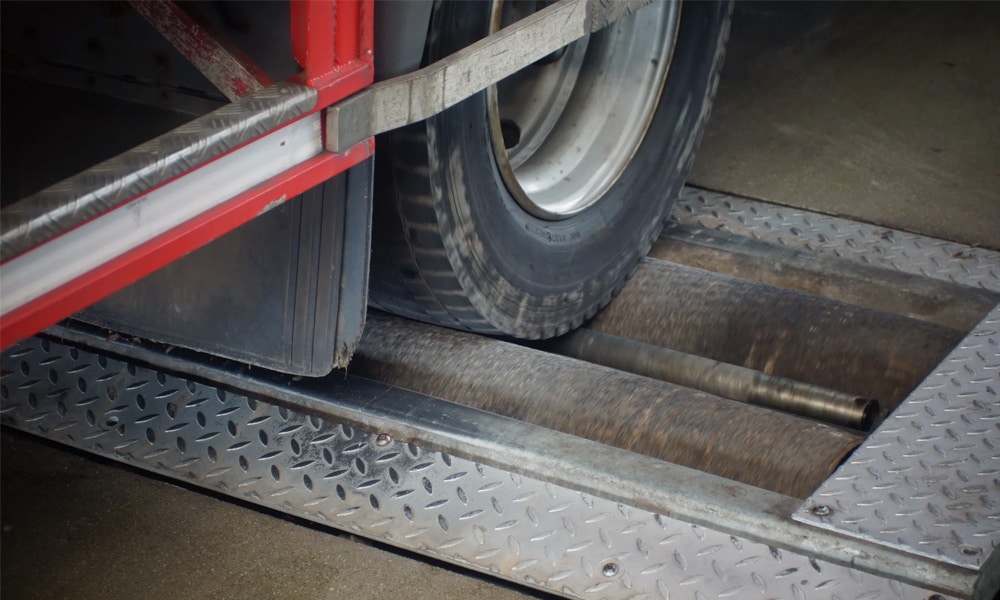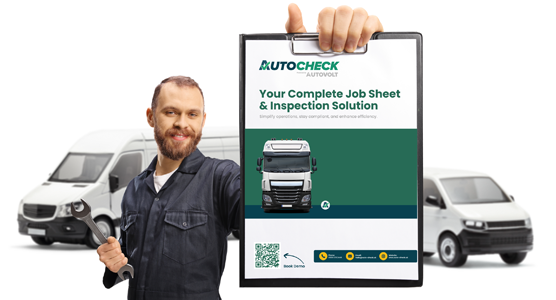Driver daily vehicle checks or walkaround inspection, is a detailed but quick check of a vehicle by the owner/driver before driving. Typically done at the beginning of each working day, the check ensures that the vehicle is in a safe, legal, and roadworthy condition. Generally, best known to be used for UK commercial vehicles, coaches and buses, lorries (HGVs), vans.
What Is a Walkaround Check?
The initial function of a walkaround check is to locate apparent or functional flaws that would pose a safety issue or make the vehicle illegal to put on the road. It doesn’t require any mechanical knowledge or special tools, just a sharp eye. A few of the most critical things drivers need to check are:
Tyres: Check all tyres for adequate tread depth (at least 1.6mm on the centre three-quarters of the tyre), for damage (cuts, bulges) and for adequate inflation.
Leaks: Check under the vehicle for any evidence of fluid leaks—oil, coolant or fuel.
Windscreen & Wipers: Ensure windscreen is clear of chips or cracks to obstruct vision. Ensure wipers and washers are working and screen wash reservoir is full.
Mechanical defects: Look for any evidence of sagged suspension, cracked springs, or anything that seems to be out of place or broken below the car.
Lights & Reflectors: All the headlights, brake lights, indicators and reflectors should be clean, unbroken and in good working condition.
Mirrors & Windows: Make sure mirrors are properly adjusted, secure and uncracked. All windows must be clean and provide good clarity.
Number Plates: Make sure front and rear number plates are fitted, legible and securely attached.
Load Security: If the car is being used to transport goods or equipment, ensure everything is securely fixed and will not shift during transit.
Brakes: When you start moving, check the brakes and handbrake lightly to ensure they are both working correctly.
These checks are easily visible to the driver so that any issues can be resolved before the journey starts.
Why Is It Relevant in the UK?
There are several important reasons, legal, practical, and safety-related, why walkaround checks need to be carried out regularly, especially in the UK where road safety is strictly maintained.
- Legal Duty
It is the responsibility of the driver under the UK law, i.e. the Road Traffic Act and the rules of the Driver and Vehicle Standards Agency (DVSA), that a vehicle should be roadworthy. Driver and vehicle operator (if any) can be fined if a vehicle is found to be unroadworthy. Commercial vehicle drivers, specifically, are expected to conduct and report daily vehicle checks, among their record-keeping requirement and Operator Licence condition compliance.
- Operator Compliance and Record-Keeping
For operators of Heavy Goods Vehicles (HGVs) or Passenger Service Vehicles (PSVs), a safe and roadworthy fleet is one of the Operator Compliance Risk Score (OCRS) controls enforced by DVSA. Walkaround checks are part of the vehicle maintenance routine of the operator and companies are required to maintain records to prove they are meeting their obligations. Not conducting appropriate checks or even recording them, could result in investigation, penalty or loss of the operator licence.
- Safety First
One of the most important reasons for a walkaround inspection is safety. Catching faults at a stage when they are still benign prevents accidents, breakdowns and costly repairs. As a case in point, an early identification of a bald tyre or faulty brake light might prevent a small fault from turning into one that is literally life-threatening on the road. Drivers, passengers and other road users all benefit from these simple preventative checks.
- Avoidance of Penalty and Fine
Operating a motor vehicle in defective or dangerous condition can lead to on-the-spot fines, endorsement of licence or a prohibition notice on the vehicle. In the worst case, it can lead to court proceedings or prosecution. A walkaround inspection avoids all these possibilities of contravention forthwith.
- Protection of Business Reputation
For hauliers and businesses relying on fleets of vehicles, a reputation for safe, compliant and reliable operations is vital. Walkaround checks every day eliminate service delays, breakdowns and negative publicity after accidents or roadside checks. They also demonstrate a good attitude towards vehicle management and driver training, which can improve customer confidence and reduce insurance costs.
Conclusion
A daily walkaround check is an investment of a few minutes with colossal payback. It’s not a legal courtesy, it’s a life-saving safety habit that saves the driver, the firm and all other road users. In business terms, it’s compliance and operational excellence. For private motorists, it’s just good road sense. Easy, efficient and vital, a walkaround check guarantees smooth safe journeys, day after day.
Created by Blayke. W





